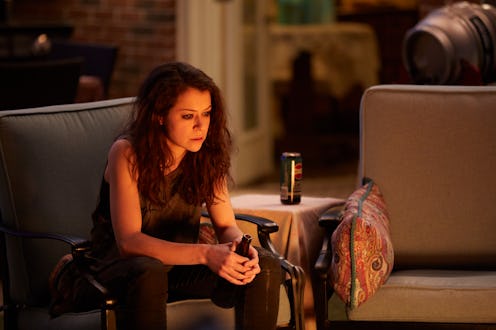
Series finales are a tough business, especially for a series as convoluted as Orphan Black. But "To Right the Wrongs of Many" was a satisfying end to the story of the Leda clones. Spoilers for the Aug. 12 episode of Orphan Black follow. The Orphan Black finale gives happy endings to all of the core clones (well, most); but before the sestras achieve closure, there is one last battle to be won. And even when all is said and done with P.T. Westmorland, one clone in particular isn't satisfied with her life and it takes the bond of this found sisterhood to give her the strength she needs to keep going.
Before the story of Sarah Manning and her sisters winds down in the series finale, Sarah, Helena, and Art need to escape Dyad alive. With the help of Art, Helena kills Virginia Coady while literally giving birth like the ultimate survivor she is. That leaves it up to Sarah to take down the clones' creator and though he tries to suffocate her, Sarah proves that evolution always wins by killing Westmorland. She does so just in time to assist Art with the delivery of Helena's twins. As Sarah recollects S. helping her deliver Kira while she coaches Helena, the emotional birth is the epitome of the beauty of motherhood and sisterhood. It results in Helena having the healthy babies she so wants and deserves.
A time jump shows Helena raising her sons "Purple" and "Orange" (she eventually names them after "real men": Arthur and Donnie) in Alison and Donnie's garage. But while Helena and Alison are more content than ever, Cosima and Sarah are still plagued with their own issues. Cosima is worried she won't be able to find all her fellow clones and save them from the disease that will inevitably kill most of them without inoculation.
But by reaching out to Rachel, Felix is able to provide Cosima and Delphine the full list of all the Leda clones (274!). Cosima and her partner can continue their journey of saving Cosima's sisters through science. Rachel, on the other hand, is exiled from the sisterhood, something she says she's fine with since she doesn't want to compare herself to the other clones anymore.
That leaves the enforcer Sarah to have the most complex emotions when it comes to dealing with life returning to normal. She is not "mended," in the wise words of Helena. Without S., she struggles with being a single mom to Kira and wants to revert back to her old ways of running away from commitment and friendship. It takes the help of her sestras Alison, Cosima, and Helena to remind Sarah — each in their own way — that no one is perfect, but they're a family now who will be there to support one another.
The birth of Helena's babies and the sisters coming together to help Sarah are the two most poignant moments of the series finale and reveal the real heart of Orphan Black. When you remove all of the science and tech, the series is about this sisterhood. While the people who created the Leda clones only saw them as science experiments, the sisters — and their loyal crew of helpers — know the humanity and individualism within each of them. And because of their unique attributes developing from the same genes, the clones allow viewers to see the miracle of nature and humanity more clearly. It's even more miraculous that despite the differences that exist between them, they've chosen to stay bonded to one another and live their lives as a family.
By these multidimensional characters (all played to perfection by real-life goddess Tatiana Maslany) choosing to be there for one another, Sarah, Cosima, Helena, and Alison display how the power of women isn't just in their strength, but in the ability to prop one another up. They created a connection that, while it may be tenuous at times, is always there when one of them needs it. This sisterhood helped Alison to end her substance abuse, taught Helena how to love, literally saved Cosima's life, and gave Sarah a greater purpose. While it'd be unrealistic to think their lives will be perfect now that the people who created them are gone, these women are able to find some peace now.
When one of them does falter, as Sarah does in the finale, she'll have her sisters there to pick her back up and show her the meaning of female solidarity. These sisters also pass this spirit of unity onto the men in their lives and their children. And if enabling others of all genders to recognize the importance of supporting one another isn't a happy ending, I don't know what is.